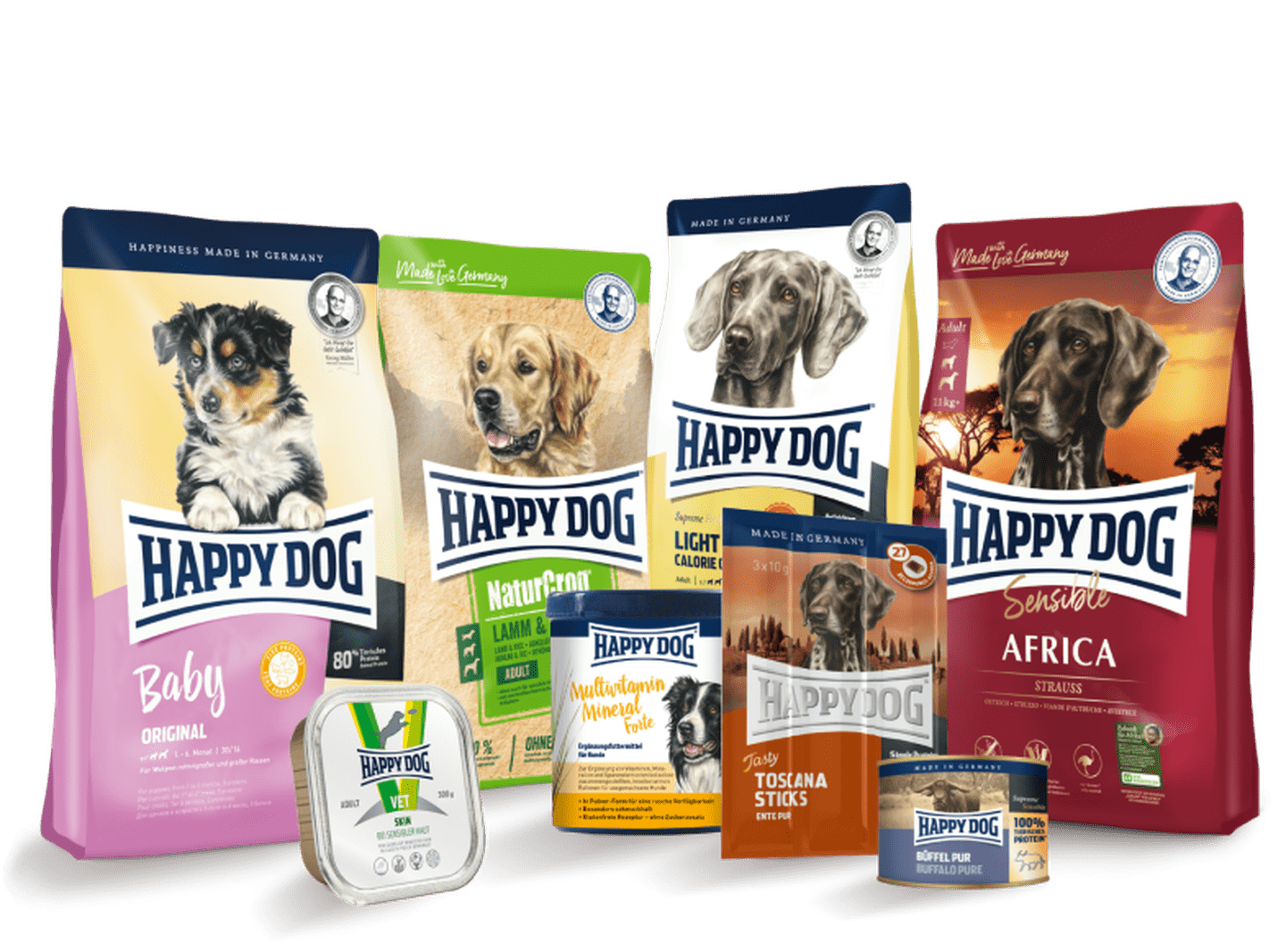It's good to know what is in there!
Our Ingredients
Our ingredients
For pet owners it is important to know that the food they are giving contains all the valuable ingredients that their pet needs. You can check this for yourself.
A species-appropriate food that meets the animal’s needs should contain the following:
Crude Protein
Protein is absorbed from the food. We distinguish between animal and vegetable protein. Proteins are essential “building blocks” for the body. They are very important for building up and maintaining muscles, internal organs, skin and hair. Proteins are made up of amino acids; the animal’s body is unable to make the essential amino acids itself.
Crude Fat
Fat is the main supplier of energy in the diet and is essential to maintain body functions such as body temperature and muscle and organ activity. The fats absorbed from the food are broken down into individual fatty acids and can then be absorbed through the intestinal mucosa. These fatty acids are referred to as essential. They include the omega 6 and omega 3 fatty acids, which are essential for a healthy cardiovascular system. Dogs also need them for growth, wound healing, immune response and for coat and skin.
Crude Fibre
Also commonly known as “roughage”. Fibre is very important for good digestion. Although it remains undigested, it binds toxins to itself on its way through the intestine and helps to prevent constipation.
Crude Ash
This means the minerals and trace elements contained in the food. Pets need them to maintain their vital functions, so they must be contained in the diet. More information is shown on the right.
Carbohydrates
Carbohydrates are components of food which, in
contrast to fat, deliver energy to the body very quickly. Carbohydrates are absorbed through the intestinal mucosa and then transported in the blood to individual organs to allow them to work properly.
Important Minerals
Calcium
One of the nutrients that make bones and teeth. It is also important for metabolic processes.
Phosphorus
Another nutrient for bones and teeth. The amount in the body regulates itself as it interacts with calcium.
Magnesium
A nutrient for bones, cartilage and teeth. Along with calcium it is important for unimpeded functioning of the nerves and muscles.
Potassium
Important for regulating and maintaining cell pressure. Also involved in various metabolic processes.
Sodium
Important for regulating the water balance, muscle and nerve activity and saliva production.
Chlorine
Together with sodium, chlorine regulates the water balance of the body. It is also a component of stomach acid.
Sulphur
Important for all body proteins (hair, skin and organs).
Important Trace Elements
Copper
Important for bones, hair and blood formation.
Zinc
A component of enzymes, important for cell metabolism, wound healing and reproduction.
Manganese
A component of enzymes, important for cell metabolism, wound healing, bones and cartilage.
Iron
A component of enzymes and important for the formation of haemoglobin.
Selenium
An important component of enzymes.
Iodine
Important for thyroid function.
Important Vitamins
The food needs to contain vitamins as the pet's body does not produce them itself or it does not produce enough. Vitamins are organic compounds and are important for development, growth and maintenance of body functions.
Deficiencies occur when the pet either receives too few vitamins or they are not adequately absorbed in the gastrointestinal tract due to diarrhoea, for example. Vitamins are divided into water-soluble and fat-soluble vitamins (see below).
The difference is that water-soluble vitamins are distributed throughout the body wherever there is water. The body is largely unable to store excess. On the other hand, the body is able to store fat-soluble vitamins in the liver.
Water-soluble vitamins
B1, B2 & B6
Important for:
The different metabolic processes within the body.
Deficiencies can lead to:
Diseases of the nervous system and disorders of the skin’s metabolism and the cardiovascular system.
B12
Important for:
The formation of blood and skin and nerve cell regeneration.
Deficiencies can lead to:
Anaemia and diseases of the nervous system
Folic Acid
Important for:
The production of new cells.
Deficiencies can lead to:
Anaemia, disorders of the skin’s metabolism, growth disturbances and deformities.
Niacin
Important for:
Recovering energy from fats, carbohydrates and proteins.
Deficiencies can lead to:
Disorders of the skin’s metabolism and the digestive tract.
Vitamin C
Important for:
Binding free radicals (fragments of molecules that are responsible for the ageing process) in the body, promoting the absorption of iron in the gut.
Deficiencies can lead to:
Skin haemorrhage, weak cartilage, bones and teeth.
Fat-soluble vitamins
Vitamin K
Important for:
Blood clotting.
Deficiencies can lead to:
Severe bleeding, often caused by rat poison.
Vitamin D
Important for:
Calcium metabolism.
Deficiencies can lead to:
Bone diseases
Vitamin A
Important for:
Growth, function and structure of skin and mucous membranes, blood cells, metabolism and vision.
Deficiencies can lead to:
Impaired growth, embryonic deformities, impaired sight and skin and cornification metabolic disorders.
Vitamin E
Important for:
Binding free radicals (fragments of molecules that are responsible for the ageing process).
Deficiencies can lead to:
Disorders of the central nervous system, the musculature or reproductive problems.
Simply put
vitamins, minerals and trace elements along with fat, protein, crude fibre and carbohydrates are vital. Our balanced and varied pet food provides a reliable supply of these substances. So you should not give any dietary supplements such as vitamin preparations without first speaking to your vet. An overdose of vitamins can cause serious health impairments.



